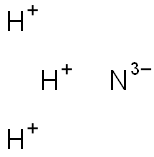Description
The hydride of nitrogen is NH3, an azane known as
ammonia. Nitrogen forms a quasi-like hydride, NH3. It
is normally encountered as a gas. However, it does not
behave as a typical hydride in that it does not decompose
in water to form hydrogen but dissolves in water
to form a weak base:
NH3 +H2O ? NH4
+ + OH
-
Ammonia, as used commercially, is often called anhydrous
ammonia. This term emphasizes the absence of
water in the material. It is lighter than air, its density
being 0.589 times that of air. It is easily liquefied due to
the strong hydrogen bonding between molecules; the
liquid boils at -33.3 °C, and solidifies at -77.7 °C
(195 K, -108 F) to white crystals. Because NH3 boils at
-33.34 °C, the liquid must be stored under high pressure
or at lowtemperature. Its solubility in water is 47%(0 °C),
31% (25 °C), 28% (50 °C). Its density is 0.86 g/cm3
(1.013 bar at boiling point), 0.73 g/cm3 (1.013 bar at
15 °C), 681.9 g/cm
3 at -33.3 °C (liquid), 817 g/cm
3 at
-80 °C (transparent solid). It is a flammable gas with
a flash point of 11 °C and an auto-ignition temperature
of 651 °C. Nitrides of the alkaline earths are generally
made by heating the metals in pure nitrogen gas.

